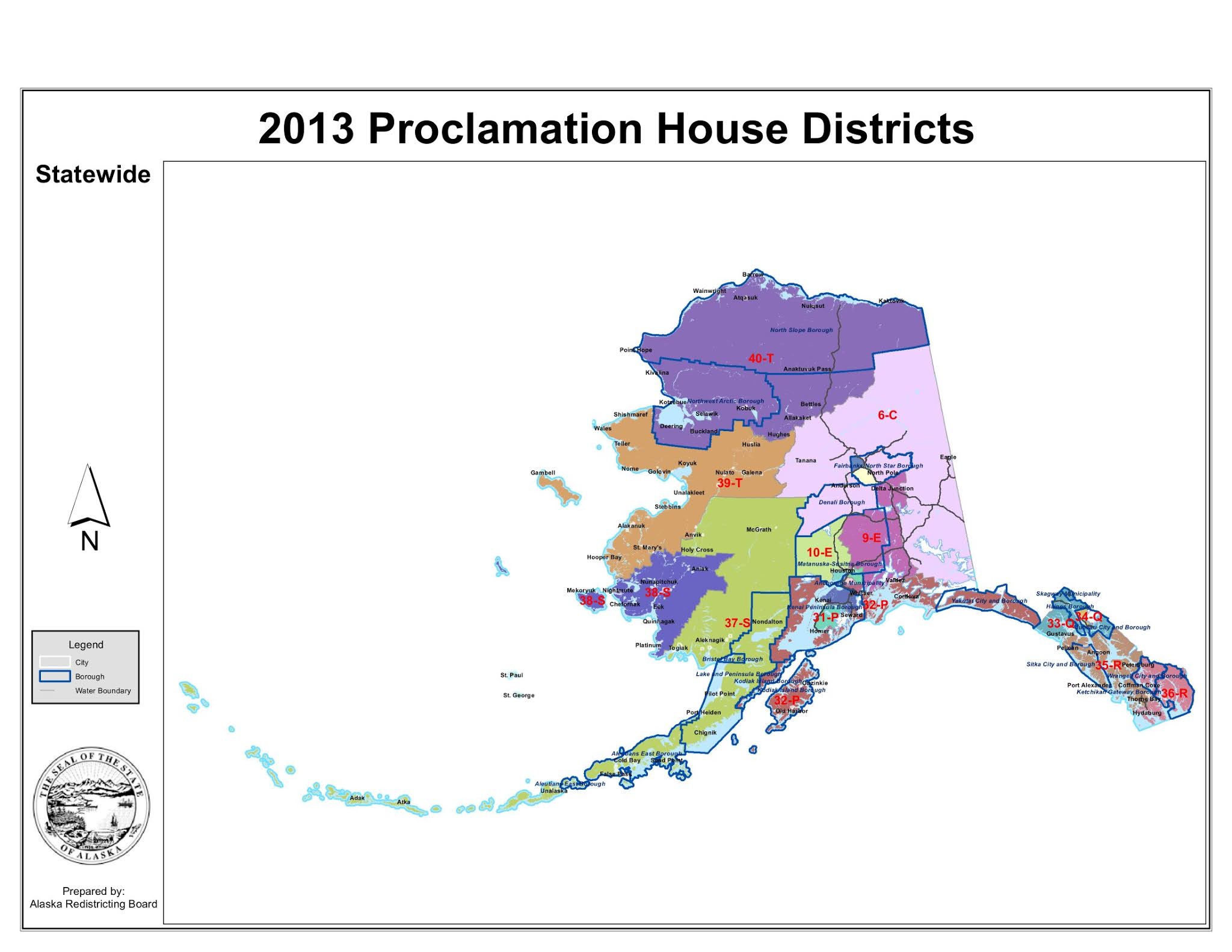Elections Have Consequences
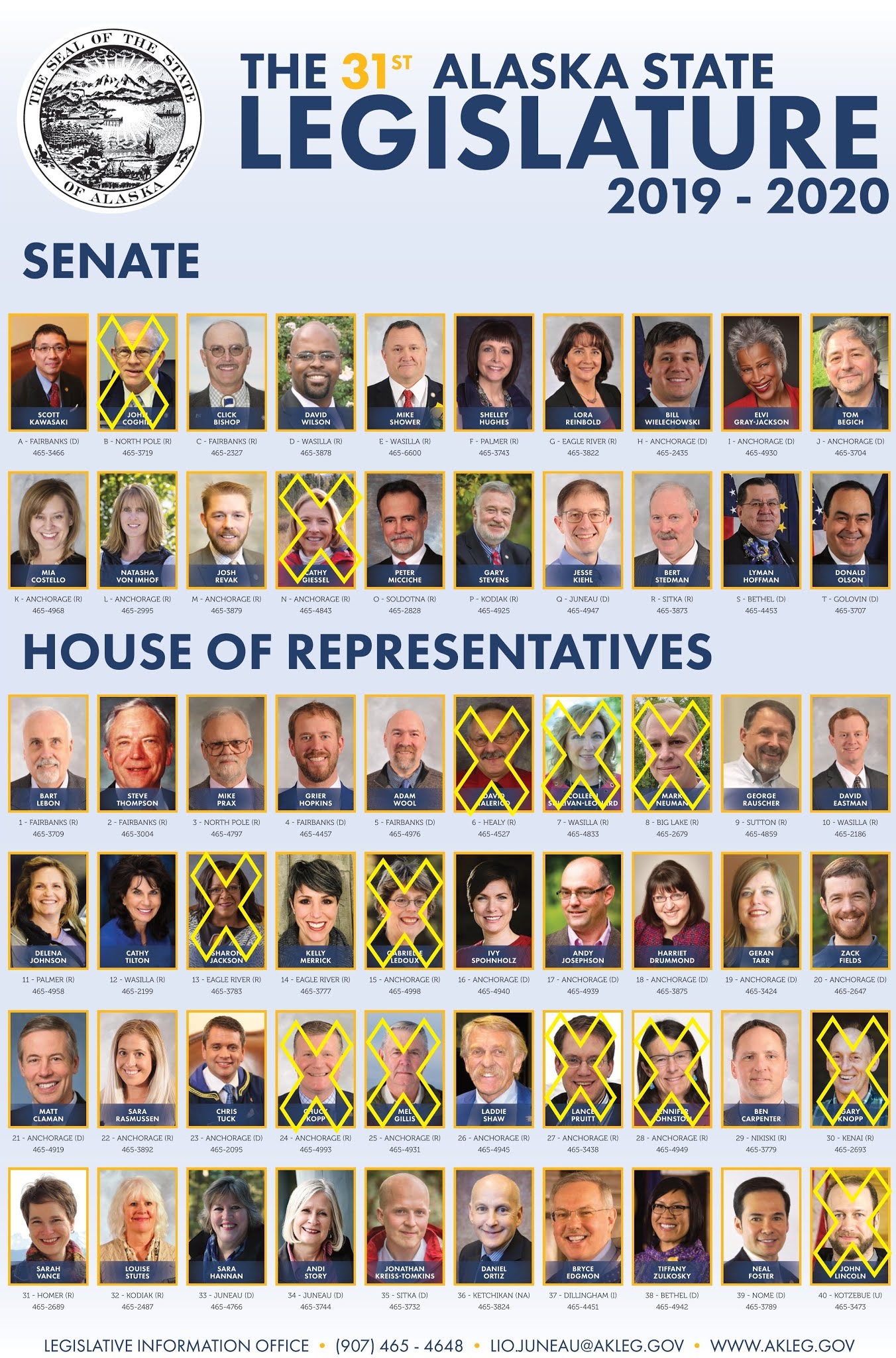
Reflections In December of 2021 on what we hoped might be possible after the election.
The Alaska Legislature in recent years has become a spectacle. We have voted for people who we thought understood what Alaskans want: Safety and Security, Limited and efficient State Govern-ment, Protection of the Permanent Fund with use of the Earnings, Economic Expansion and Financial Accountability, and Liberty. During campaigns for office we frequently hear slogans and happytalk from candidates promising all of these things and more. But, once elected many head to Juneau to form coalitions accommodating special interests.
From some districts it appears some legislators forget all about whose votes sent them there.
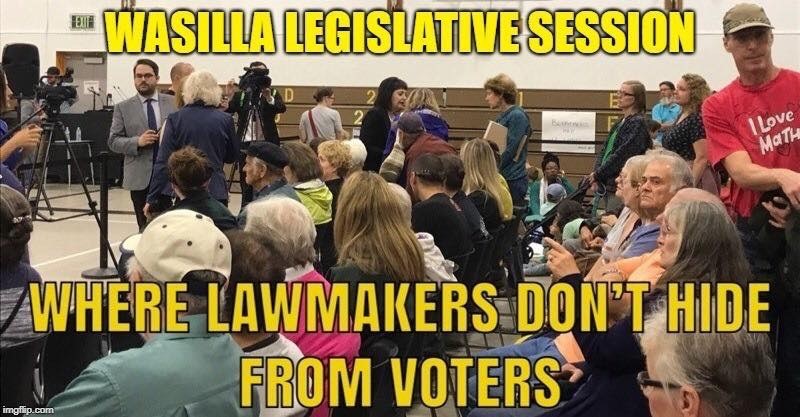
Alaska voters have experienced a learning curve as former Gov. Bill Walker and legislative majority coalitions decided to ignore the more than 40 year tried and true formula for distribution of the Dividend to Alaskans from earnings of the Permanent Fund. This was done to accommodate the public sector unions and other special interests wanting to buy more government. Voters saw some of these lawless legislators refuse to meet in Wasilla at a Special Session called by Gov. Michael Dunleavy–who is specifically charged with determining where the Special Session shall be held. Instead, the mongrel majority met in Juneau in defiance of the governor and the Alaska constitution. Voters have also learned over the last year about the organizing tool of a Binding Caucus as a means for a few legislators in positions of power to muscle the rest into ever increasing budgets that nobody is accountable for. So now that the 2020 elections are over let’s look at who is–and is not–going back to Juneau. At this time the House is having trouble organizing again as it did in the last session. So let’s consider what we might expect from the 32nd Alaska Legislature convening January 19, 2021.
Two of ten senators were replaced in the Primary Election and 11 of 40 house members lost their seats in either the Primary or the General Election (three didn’t run for re-election). Some others got wake-up calls. In the August 18, 2020 Primary Election eligible voters picked from candidates on either the Closed Republican ballot or the open Democrat ballot.[1]
Let’s do a body count district by district.
We all are familiar with what happened in the big races for US Senate (Dan Sullivan) and Representative (Don Young). After truly obscene amounts of money were spent against them, by the same outside interests that benefit from a North-Seattle Alaska capital, results of General Election legislative races are intriguing.[2]
Election Overview
The Senate:
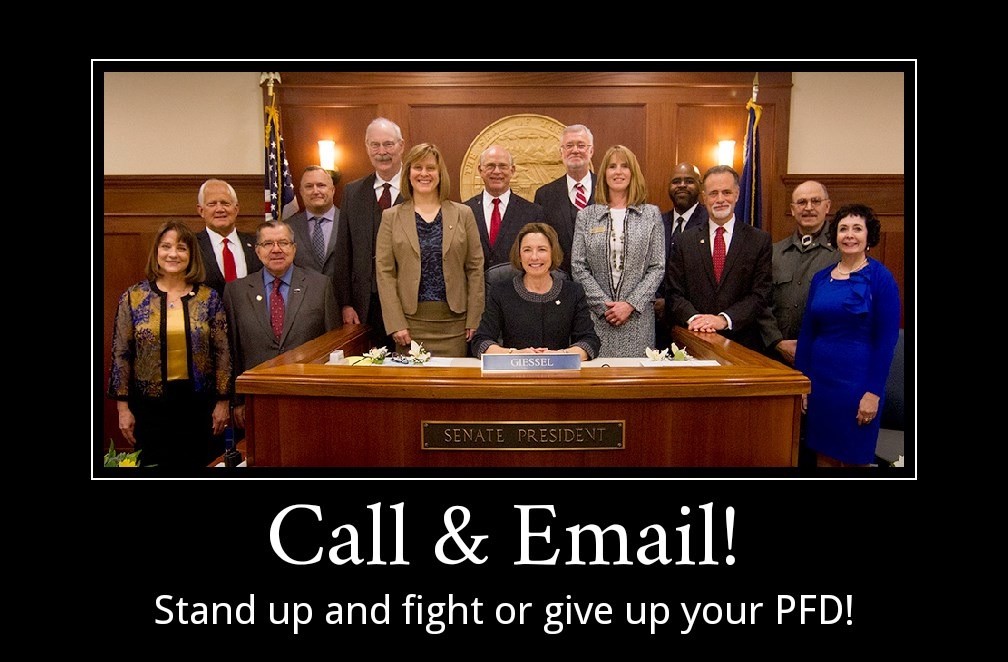
Only 10 senate seats are up for election every two years and a couple of big dogs went down in the Alaska Senate. In the postings here I will report the percentage by which winners won by if they had a challenger.
Most notably, District B saw John B. Coghill, Jr. defeated by Robert H. Meyers, Jr.
As the son of one of the signers of the Alaska Constitution, Coghill’s loss was big. Sen. Coghill had been in the Legislature first as a Representative since 1999, and it took a groundswell of opposition to extract him from a position he used to reduced protections for Alaskans as a cost-saving measure under SB91. The result of that change in law and public policy was expensive and degrading to our Alaskan way of life. Gov. Dunleavy finally overturned it through a tumultuous special session.

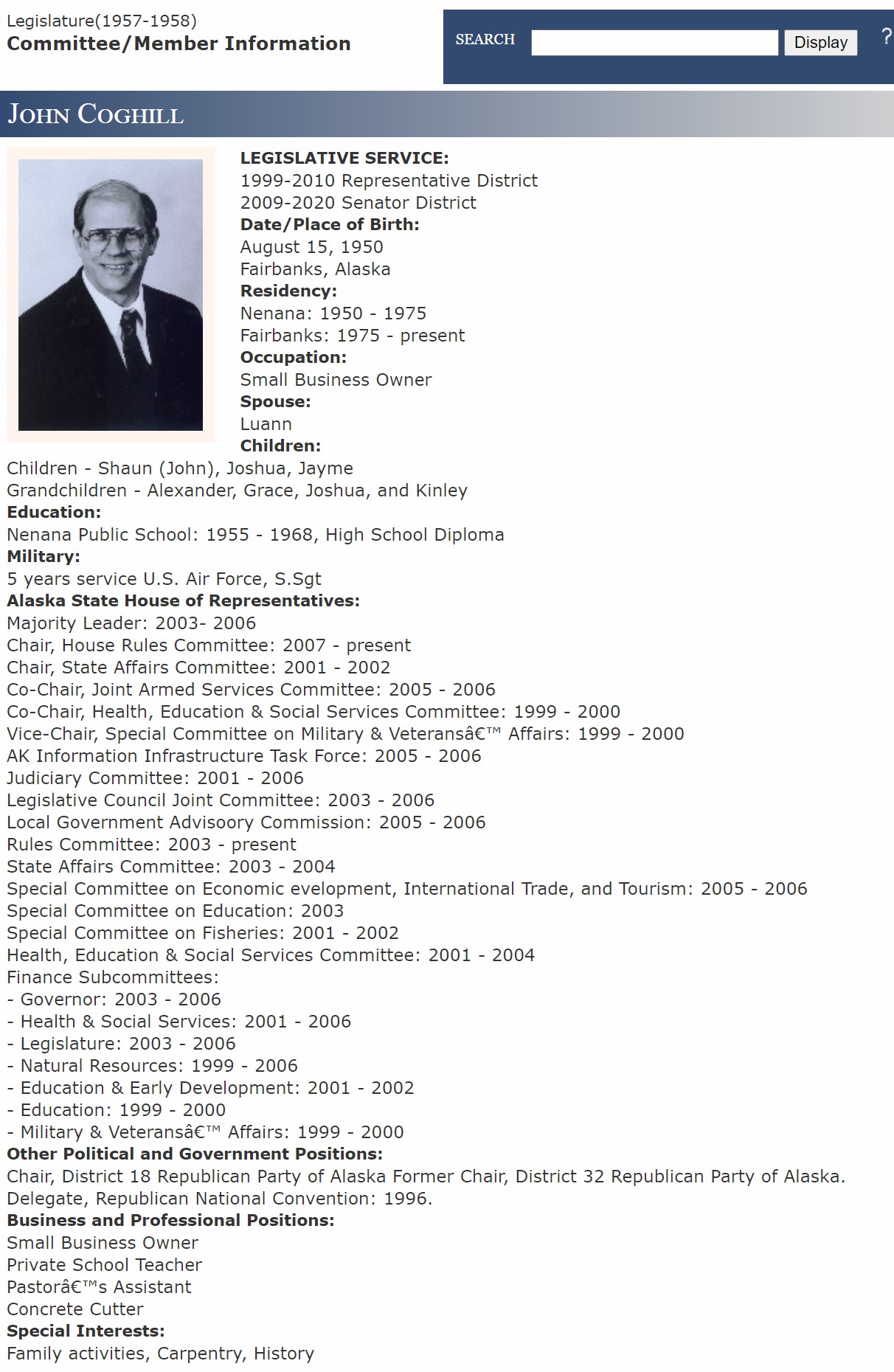

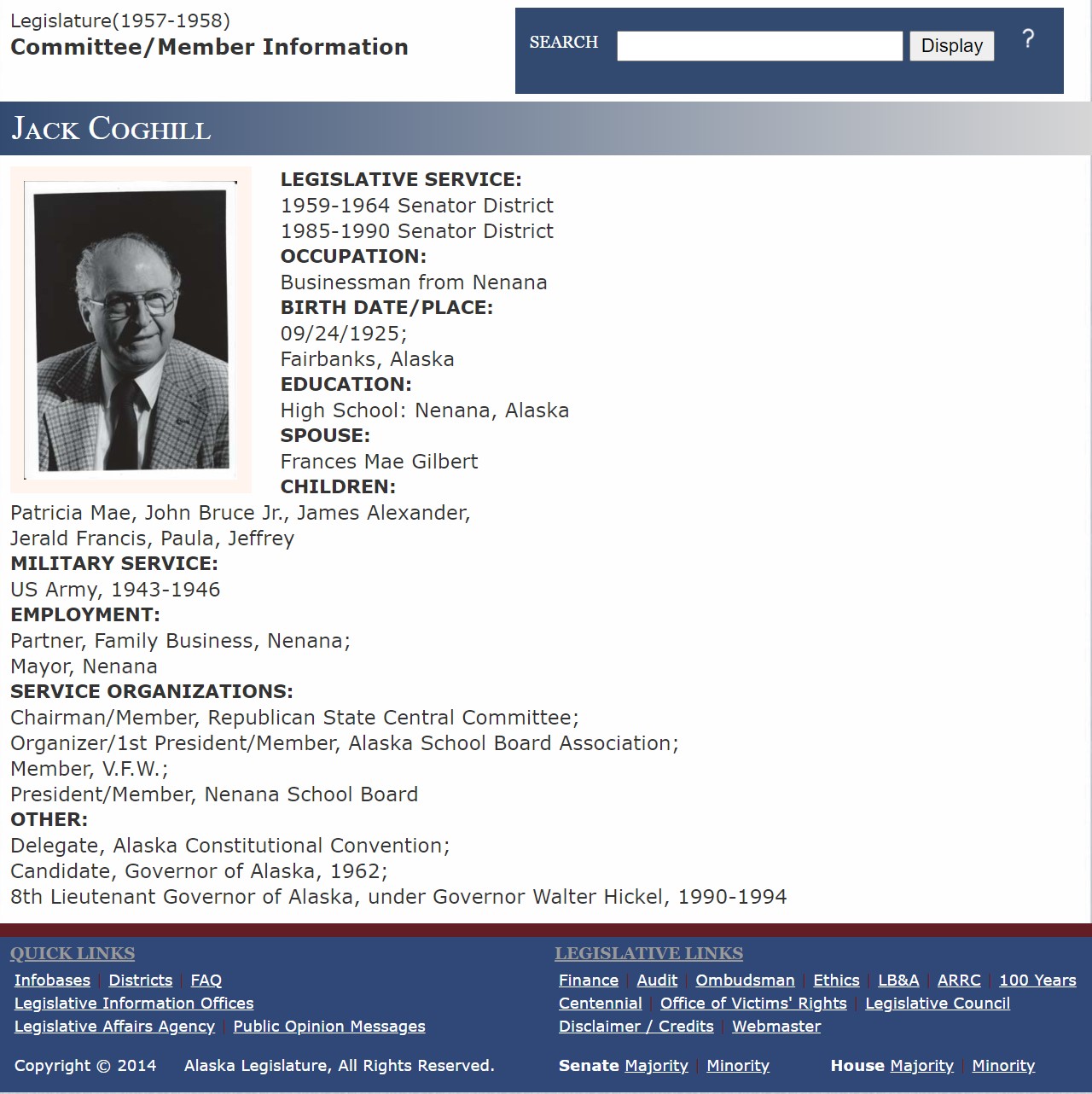
In District D in the Mat-Su Valley, incumbent, David Wilson, had five challengers in the Republican Primary ballot. They split the 5,123 votes cast. Wilson’s count was 1,736 (33.89%) and his closest competitor Stephen Wright polled 1,330 (25.96%). On the Democrat side Thomas Lamb got all 1,329 votes available. In the General Election Lamb was joined by another Democrat, Dan Mayfield and they split that vote nearly evenly 2,616 to 2,622. Wright ran a write-in smear campaign of no consequence against the Republican. Sen. Wilson received 12,631 votes to win (69.19%).
District F, again in the Valley saw incumbent Shelley Hughes gain all 4,759 Republican Primary votes while Undeclared/Democrat Stephany Jeffers gained 1,992. Lately the Democrats have run bait-and-switch placeholders in the primary and then put their big gun in at the general election. The strategy usually fails or allows somebody who could not have won in the primary to jump in and fool enough voters to get elected, as Gov. Bill Walker did to change the way our PFD is distributed under statute. Jim Cooper ran as a Democrat and gained 4,908 votes. Gavin Christiansen ran as a Libertarian and gained 999 votes. Hughes won the General Election with 14,775 votes (71.34%).
District H, Anchorage saw Republican Madeleine Gaiser gain 1,874 votes in the primary to incumbent union lawyer Bill Wielechowski’s 2,218 in the Democrat open. Gaiser’s numbers increased to 5,330 in the general. Wielechowski won with 7,304 votes (57.73%).
District J East Anchorage, saw incumbent Tom Begich cake walk to victory with no challenger in either the primary or in the general.
District L saw a spirited Republican challenge of Sen. Natasha Von Imhof (2,165) by Stephen Duplantis (1,884) in the primary election. Democrat Roselynn Cacy received 2,856 votes in the open primary. Von Imhoff received 10,410 (59.72%) in the general election to Roselynn’s 6,725 votes.

For District M Incumbent Joshua Revak easily won the Republican primary. Two strawman candidates ran in the Democrat primary with Anita Thorne (2,732) over Willie Nicholas (389). In the general election former Anchorage Education Association President, and current ASD School Board Member, Andy Holleman completed the Democrat switch to lose in the general election 7,607 to Revak’s 10,410 (57.60%).
District N saw Alaska Senate President Cathy Giessel (2,055) primaried by Roger Holland (3,687) in the Republican Primary. This was a stunning defeat for status quo Republicans and RINOs. In the Democrat primary Lynette Moreno Hinz (1,907) to Carl Johnson (2,247). Holland won the general election 10,512 (49.66%) over Johnson’s 9,650. Retired ASD teacher Libertarian Carolyn Clift drew 965 votes.
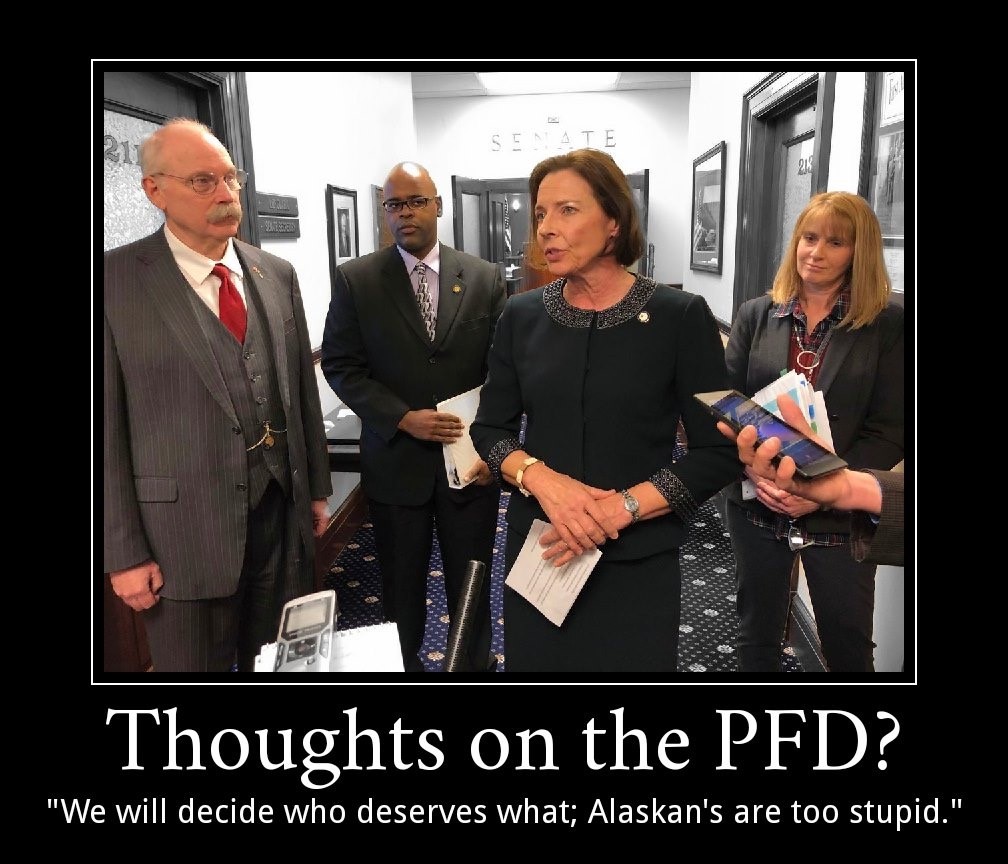
Rural districts P, R and T affirmed the status quo with re-election of Gary Stevens, Bert Stedman, and Donald Olson respectfully.
In sum, two Senate seats changed: District B: Coghill to Meyers and District N: Giessel to Holland. Most of the rest won with strong numbers.
The House of Representatives:
HD1 Incumbent Rep. Bart Lebon received 1,037 votes in the primary against a combined total of 1,396 votes for two democrats. In the general Lebon won re-election by 3,769 (55.30%) to Christopher Quist’s 3,027.
HD2 Incumbent Steve Thompson (452) Republican challenger Dave Selle (413) in the primary. Thompson (3,632) went on to beat Democrat Jeremiah Youmans (1,565) in the General Election with 69.57%.
HD3 Incumbent Glenn Prax was unopposed in the primary or the general. He had been appointed by Gov. Dunleavy to fill the term of Tammie Wilson who took a state job at the Alaska Department of Health and Social Services. She had served since December 3, 2009 after a short term on the Fairbanks North Star Borough Assembly.
HD4 Keith Kurber (1,434) in the Republican primary to Democrat Grier Hopkins (2,369). Hopkins won 5,478 (53.98%) to Kurber’s 4,649 in the General Election.
HD5 Incumbent Democrat Adam Wool (4,341) 52.79% beat Kevin McKinley
(3,867) in the general election.
HD6 Three candidates ran in the Republican primary with Mike Cronk (1,337) winning. Democrat Primary winner was Julia Hnilicka (1,189). Cronk went on to win the General Election with 4,861 (55.80%) to Hnilicka’s 2,626 votes, despite participation trophies from three other candidates who siphoned off 1,203 votes in also-ran campaigns.
HD7 Republican Christopher Kirka (6,449) 73.77% won the General Election over Jamin Burton (2,252). The Republican Primary saw Valley farmer and previous legislator, Lynn Gattis (762) lose to Kurka (1,724).
HD8 Incumbent Mark Neuman (1,000) lost the Republican Primary to Kevin McCabe (1,807). The General Election resulted in McCabe (7,533) 81.44% to Democrat Alma Hartley (1,683).
HD9 Republican incumbent George Rauscher (7,496) 71.92% beat Democrat challenger Bill Johnson (2,870) in the General Election.
HD10 Incumbent David Eastman (1,589) beat Mat-Su Borough Assemblyman Jesse Sumner (1,420) in a primary race with more smoke than fire. Eastman (7,659) 73.70% won the General Election easily against Democrat challenger Monica Stein-Olson (2,693). There may be some hard feelings among some Republicans in this race but Eastman is a force to be contended with.
HD11 Incumbent Republican DeLena Johnson (7,383) 74.09% beat Democrat challenger Andrea Hackbarth (2,553).
HD12 Republican cumbent Cathy Tilton had no opponent and received 8,881 (95.63%) votes.
HD13 Incumbent Rep. Sharon Jackson had been appointed by Gov. Dunleavy to fill this position after he appointed newly elected Rep. Nancy Dahlstrom as Commissioner of Corrections. Jackson (573) lost this Eagle River/Chugiak seat to Ken McCarty (722) in the Republican Primary. McCarty (4,730) 67.57% beat Democrat James Canitz (2,250) in the General Election.
HD14 Eagle River Republican Incumbent Kelly Merrick (7,602) 71.77% easily beat General Election candidate Mike Risinger (2,960).
HD15 Incumbent Muldoon legislator Gabrielle LeDoux (305) lost in the Primary Election to David Nelson (628). Nelson (2,541) 50.82% went on the beat Democrat Lyn Franks (2,446) in the General Election.
HD16 Incumbent Ivy Spohnholz (4,014) 53.04% won re-election in the General Election, with a Looney Libertarian assist by Scott Kohihaas (474), against Republican Paul Bauer (3,069).
HD17, 18, 19, 20, 21 all saw incumbents win in this liberal Anchorage bastion; Andy Josephson, Harriet Drummond, Geran Tarr, Zack Fields, Matt Claman.

HD22 Republican incumbent Sara Rasmussen won re-election handily.
HD23 Incumbent Democrat Chris Tuck (3,463) 47.79% won his re-election over Republican challenger Kathy Henslee (3,122) with a lifesaving assist by AIP candidate Timothy Huit (650).
HD24 Incumbent Chuck Kopp (1,121) was primaried by Thomas McKay (1,737). McKay (5,617) 56.31% went on to win the seat over Democrat Sue Levi (4,329).
HD25 Incumbent Republican Mel Gillis (4,217) lost in the 2020 General Election to Democrat Calvin Schrage (4,595). Gillis had been appointed by Gov. Dunleavy and was unanimously confirmed and sworn in on December 2, 2019. This was the House seat previously held by Josh Revak. Gov. Dunleavy appointed Revak to fill the senate seat vacated by death of Chris Birch, who died suddenly on August
8, 2019.
HD26 Incumbent Republican Laddie Shaw won re-election unopposed.
HD27 Incumbent Republican since first elected in 2011, Lance Pruitt (4,562) lost to Liz Snyder (4,575). Pruitt was minority leader and had previously served as Republican Majority Leader. This was a surprise loss and Pruitt challenged it in court due to election irregularities.
HD28 Incumbent Jennifer Johnston (1,242) lost in the Republican Primary to James Kaufman (2,444). Democrat straw man Adam Lees gained 2.211 votes. Again, in a desperate effort the Democrat bait-and-switch saw Anchorage Assemblywoman Suzanne LaFrance (5,698) substituted for Lees to lose in the General Election to Kaufman (6,160). This was a clear move to the right for this district whose Republican representative had joined a Democrat coalition for the last time.
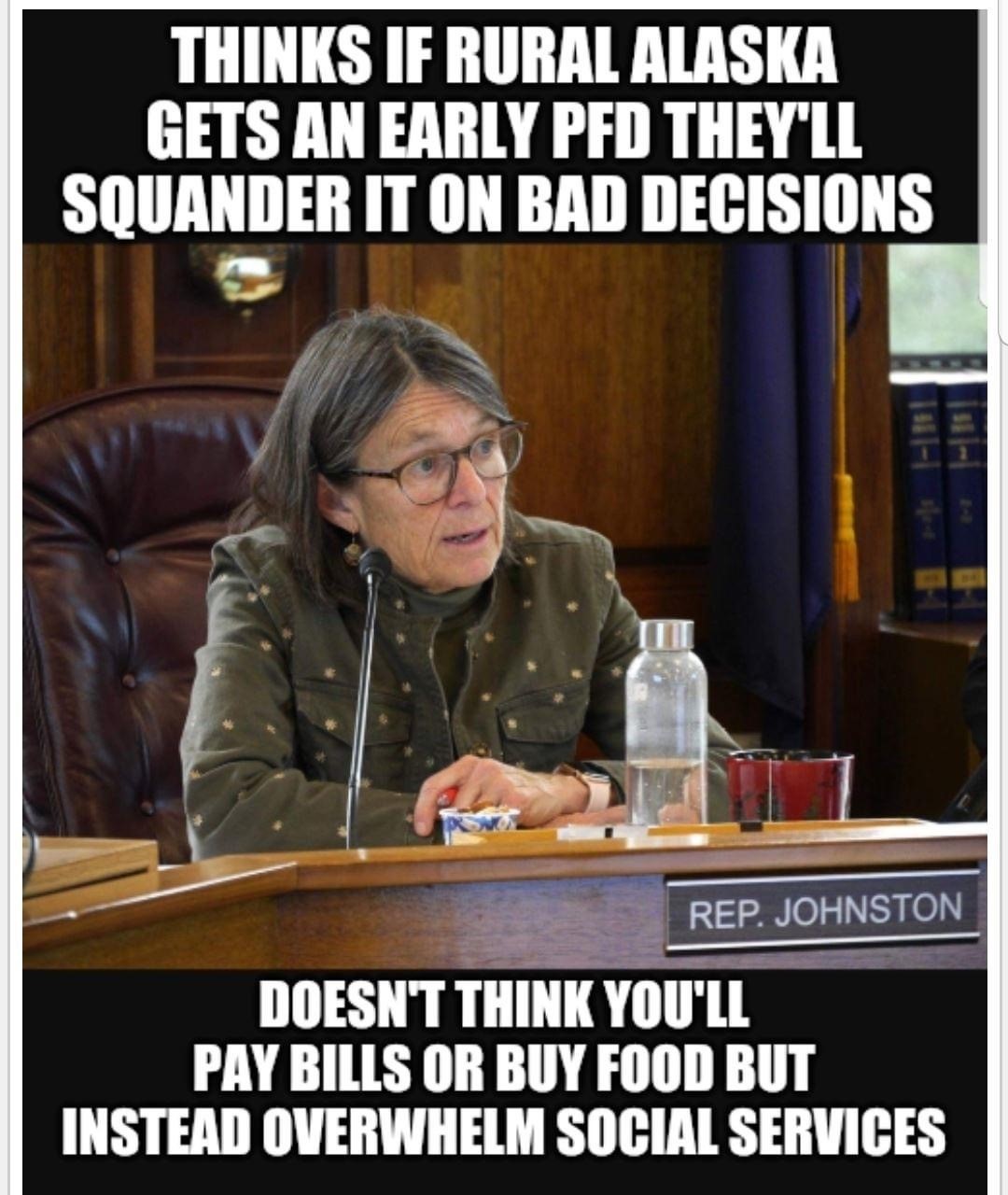
HD29 Incumbent Republican Benjamin Carpenter (6,560) won easily over his General Election opponent Paul Dale (3,482).
HD30 A recall effort was launched against incumbent Kenai Rep. Gary Knopp in May of 2019 requiring 1,000 names on the petition to gain opportunity to officially seek his removal from office. It was approved and would have required 3,000 signatures to cause a recall election. This was triggered by Knopp’s role in forming a majority coalition with Democrats when the people had elected a majority of Republicans to the House.[3]
As described in Ballotpedia:
Recall supporters argued Knopp’s actions contributed to delays and disruption to the 2019 legislative session, which prevented the legislature from finishing all of its scheduled work. Prior to the legislative session, Knopp announced that he was leaving the Republican caucus and would help form a majority coalition with Democrats. He said, “A 21 member caucus cannot succeed. It’s doomed for failure and I’m not going to be on that train. I’m not joining the Democrats either. I’m doing this to try and force a true coalition.”[4] Over 30 days in January and February, Knopp helped to form a coalition of 15 Democrats, eight Republicans, and two members unaffiliated with either party.
That coalition elected Bryce Edgmon (undeclared) as House speaker on February 14, 2019. This resulted in the parties having split control of key leadership positions in a power-sharing agreement.
Due to the delays at the beginning of its session, the legislature was unable to finish all of its work. In response, Gov. Mike Dunleavy (R) called the legislature into a 30-day special session on May 15, 2019. That special session was tasked with passing legislation related to criminal reform, the operating budget, the mental health budget, the capital budget, and education funding.[5] A second special session was held from July 8 to August 6 to address the state’s capital budget and Permanent Fund dividend.[6]
Knopp was also censured by the Alaska Republican Party in May 2019 for his role in the disruptions to the start of the 2019 legislative session. Because of the censure, the state Republican Party stated that it would no longer support Knopp.
God recalled Rep Knopp in a mid-air plane collision when his piper PA-12 hit a DHC-2 Beaver carrying six.[7]
According to a story in the Anchorage Daily News: “National Weather Service reports from the Soldotna airport for Friday morning showed clear visibility, with broken clouds at 10,000 and 4,500 feet.”[8]
That was distinctly different weather than Knopp had caused in the Alaska Legislature with his duplicitous maneuvers. Knopp still received 463 votes as a dead man in the Primary Election to Ron Gillham’s 1,611 62.38% votes. A third Republican, Kelly Wolf received 658 primary votes. Nobody bothered to run in the Democrat open primary in this strong Republican district. Gillham (5,750) went on to win the General Election against johnny-come-lately James Baisden (3,328).
HD31 Incumbent Sara Vance had no opposition in the primary election but Kelly Cooper ran against her in the general. Vance 6,479 54.24% to Cooper (5,443).
HD32 Democrat in Republican clothing incumbent Rep. Louise Stutes won re-election in the Kodiak district. She may be the Republican in the coming legislature who again gives the majority coalition to the Democrats. No surprise.
HD33 Juneau Democrat Sara Hannan won election with no opposition.
HD34 Knowledgeable non-declared economist candidate Edward King (3,806) lost to incumbent Democrat Andi Story (6,284) 61.98% in this second Juneau district.
HD35 Incumbent from Sitka, Democrat Rep. Jonathan Kreiss-Tomkins (5,682) 58.67% beat Hoonah challenger Kenny Skaflestad (3,972).
HD36 Nondeclared (Democrat) incumbent Dan Ortiz (5,409) 60.29% didn’t run in the Primary Election but beat Republican Primary winner Leslie Becker (3,516).
HD37 Democrat-turned-Nondeclared Incumbent Bryce Edgmon had no opponents in his run for re-election. He has been House Speaker in the mongrel coalition.
HD38 Vetran’s Party Candidate, Willy Keppel (1,919) ran against Incumbent Democrat, Tiffany Zulkoski (3,170) 61.94% in this race.
HD39 Democrat incumbent, Neal Foster was easily re-elected (3,623) 64.03% against challenger Republican Dan Holmes (1,044).
HD40 Democrat Elizabeth Ferguson won the Open Primary, to be swamped in the General Election by undeclared (Democrat) Josiah Patkotak (2,292) 52.14% to her 2,086 votes.
It has almost become a cliché that everything has changed with the China Virus, but even now after some 10 months of cautious public health policy, we have a vaccine. Public pressure has caused the Alaska Legislature to realize that voters are watching and we don’t care anymore about excuses. Our economy is in freefall, state spending is still out of control, public employees have not missed a paycheck while our unemployment rate skyrockets. It is time to invest in the people who live here, open our schools, and help businesses that serve our needs. Legislators will be challenged to convene a session in Juneau soon under imposed health constraints, but it is time to deliver economic relief to the Alaskan people instead of another series of episodes featuring childish political maneuvering.
If not, the next election is only two years away.
References:
[1]Primary Election Results
https://www.elections.alaska.gov/results/20PRIM/data/sovc/ElectionSummaryReportRPT20.pdf
[2]General Election Results
https://www.elections.alaska.gov/results/20GENR/data/sovc/ElectionSummaryReportRPT24.pdf
[3]Peninsula Clarion
[4]The Political storm Rep. Kopp faced
http://mustreadalaska.com/trouble-knopp-two-opponents-recall-possible-party-party/
[5]KTUU, “Dunleavy to call Legislature into special session over budget, PFD, crime, education,
more,” May 15, 2019
[6]Alaska Public Media,
“Dunleavy calls for round two in Wasilla after Alaska Legislature adjourns
first special session,” June 13, 2019
[7] ADN Story about Rep. Kopp airplane crash
https://www.adn.com/politics/alaska-legislature/2020/07/31/shock-and-sadness-after-state-legislator-gary-knopp-dies-in-midair-crash/
[8]Second ADN Story about Rep. Kopp airplane crash
https://www.adn.com/alaska-news/aviation/2020/07/31/planes-collide-in-midair-near-soldotna-ntsb-says/#1111


